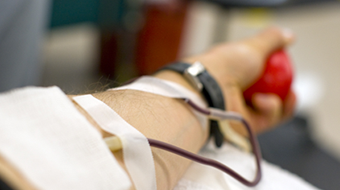
Most of us are repulsed by the sight of blood. We bandage our razor-thin papercuts. We purchase pre-salted, pre-packaged meats. When reading about the avodah, some of us are secretly relieved not to witness the messy scene of sprinkled blood and animal carcasses.
Most of us associate blood with war, pain, death or vampire stories. In fact, it is the fluid that colors our bodies with life and our cheeks with a rosy glow. It is the liquid through which our Covenant with God is formed.
At 16, I lived near a hospital and often passed a sign board asking for blood donors. I did not like hospitals, doctors, needles or blood, but I was curious at the process and convinced myself to try it once to see what it was about. I was shaky, but emboldened by the warm smiles of the hematologists, only to discover one had to be 17 to donate. The challenge of being turned away made me more determined than ever but having months to dwell on it increased my nerves as well.
I returned with a friend at 17, as I had lost some of my initial courage and incidentally, they processed her first. They could not find her vein and to our dismay, had to re-insert the needle several times.
I watched my friend squirm in pain and was ready to bolt but did not feel it would be fair to her as I had gotten her into that situation and so I too went through with it. We were both bemoaning our self-inflicted fate and our cursed desire to save the world. But when we were done, we had made history.
We were the youngest unsolicited donors the hospital had ever had walk in and they made sure we knew it. They pampered and praised us and let us know each pint could save up to three lives. They encouraged us to return. We felt very good and wore our purple and yellow hematoma badges of bravery very proudly – nevertheless, determined that once was more than enough and neither of us would ever return.
But I kept seeing the blood donor sign again and again. I heard ambulance sirens screech with urgency. I saw ill people transported by wheelchair or gurney. I was conscious of accident, disease, death and how ‘there but for the grace of God’ go I, as it could have been me sick, hurt or dying. I thought of boys who enter the army at that age, children battling diseases or what my parents had faced during the war and felt shame at m yrelatively puny act and my fear of a simple needle’s prick. The thought that galvanized me to return was that I had a choice and the people on the receiving end did not. I would much rather muster a little fearlessness in gratitude for my health than in the battle for it. I went back.
And I kept going back. I always turned my eyes aside but I kept going back. I started eating a more nutritious diet so that I wouldn’t be turned down for low hemoglobin. I formed friendships with the nurses and hematologists. I collected lots of umbrellas, t-shirts and mugs for my donations. I felt reassured at my free check-ups. And when I felt remorse for some sin, I prayed to God to let my donations balance the scales for me – to always keep me on the giving end—not the other.
I started seeing people differently too. The big muscular sanitation guy who fainted when donating for his wife. Or the line of pale, skinny chassidim who eagerly lined up for a friend. And as I walked the halls of the hospital, I’d wonder “who received my blood?” Blood donations are for the most part anonymous. I remember being jostled one afternoon by a rude woman in a deli, and randomly thought how it was possible that I had donated blood for this very woman. I wondered: would we feel more generous and tender towards each other if we knew for sure to whom our blood went?
The same is true with the money we donate. We don’t usually get to know who directly benefits from it. This forced me to consider how much simpler it was to be big-hearted anonymously than face-to-face. I started seeing myself differently too. As much as I felt I wanted to help “people,”, they were anonymous. Did I really want to help the pushy rude people in the deli or people I disliked? Or only people I didn’t know? Was I really donating to help others or to boost my own ego? To feel good and important? Was I addicted to this? Did I truly save any lives? Donating forced me to confront myself, my motives and align my heart with my actions.
After many years, I reached a five-gallon milestone and I decided to sponsor a blood drive at that time. The rabbi in charge motioned to a nearby watercooler and casually pointed out that it was a five-gallon bottle. I stared at the size of that blue bottle, struck with the magnitude of what I had done.
Whether I had done it out of cowardice, bravery, goodwill or ego, didn’t seem to matter at that moment. I had accomplished something worthwhile, one pint at a time. And so can anyone else. It’s the simplest way to save lives.
For more information on donating blood, go to redcrossblood.org. You can also contact your local hospital’s blood bank or your local bikur cholim at bikurcholimcc.org
The words of this author reflect his/her own opinions and do not necessarily represent the official position of the Orthodox Union.
